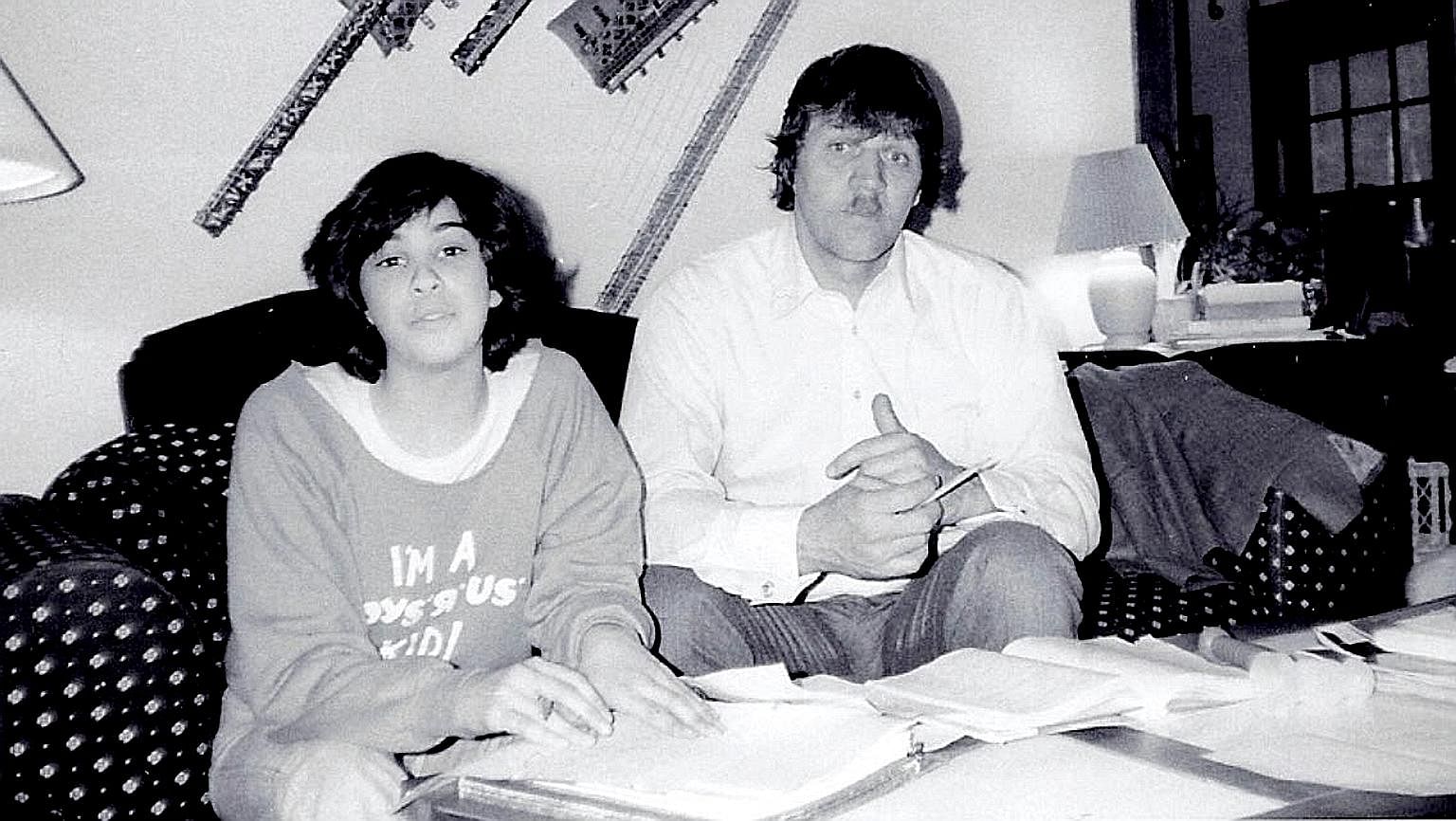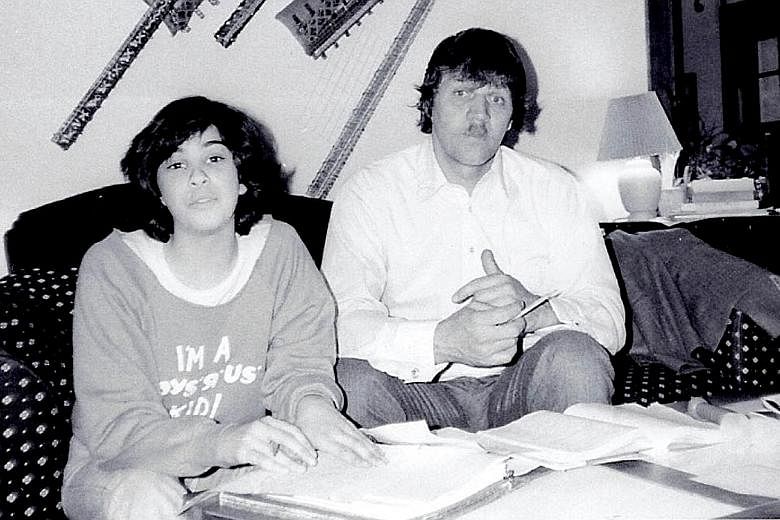#MEAT14: CAN YOU SAY 'YES'?
What were you like when you were 14?
Tens of thousands of women and men have been tweeting pictures of themselves at that age, in a social media campaign that followed recent allegations of sexual misconduct against Republican US Senate candidate Roy Moore of Alabama.
Mr Moore, 70, was accused by two women of initiating unwanted sexual encounters when he was in his 30s and they were 14 and 16 years old. Other women, too, have come forward with claims that he pursued them when they were teenagers.
He has denied the allegations.
North Carolina lawyer Catherine Lawson was the first person to tweet the hashtag on Nov 10, and it has since been used more than 50,000 times.
"Can't consent at 14. Not in Alabama. Not anywhere," she tweeted.

In an interview with the BBC, she said: "I shared a picture of me at 14 to illustrate there is no acceptable version of this story; teenagers can't consent to a relationship with a grown man, ever."
The legal age of consent varies across US states, ranging from 16, which is the minimum, to 18.
Prominent names have also joined in.
Actress Alyssa Milano tweeted her #MeAt14 story: "I worshipped my brother. I loved my dog, Pucci. I loved OMD. I had Big hair. I was happy. I was innocent."
She was also behind the #MeToo campaign, which encouraged victims of sexual harassment to come forward following allegations against Hollywood producer Harvey Weinstein.
The spate of high-profile scandals - the latest involving Democratic Senator Al Franken, who was accused of kissing and groping a radio talk show host - has sparked a discussion on attitudes towards sexual harassment.
Some 64 per cent of Americans now deem sexual harassment in the workplace as a "serious problem", up from 47 per cent in 2011, according to a Washington Post-ABC News poll conducted last month in the wake of the Weinstein scandal.
NOT ALL'S PRETTY WITH THIS BEAUTY APP

Flawless skin, rosy cheeks and doll-like eyes.
Those going after the perfect selfie have their lists of go-to beauty filters and photo editing apps.
Now, there is a new app that promises to deliver the opposite effect.
MakeApp has raised eyebrows by introducing a controversial "make-up removal" feature that uses artificial intelligence to strip away make-up on a face in a photograph or video to reveal the bare-faced look.
Users can upload pictures or videos - including images found online - for a close-up look beneath the layers of long-wear foundation and smudge-proof mascara.
If you are already recoiling in horror, brace yourself for this: This special feature not only reveals imperfections - it may even add to them. Some users have complained that the app made them look worse than they do by adding wrinkles and blemishes that were not there in the first place.
But the real problem with this app is more than skin deep, some argue. The premise of this invention, they say, is misogynistic.
"Stealing a woman's choice to wear - or not wear - a full face of make-up is problematic," Harper's Bazaar senior beauty editor Jenna Rosenstein told Huffington Post. "We must ask ourselves: What exactly is the purpose of this app, and what is the male equivalent?"
Telegraph beauty editor Victoria Hall added: "Some might argue - and have done on Twitter - that with make-up women are 'employing' trickery to fool men into thinking they look like that naturally, so it's only fair that an app can rebalance the order."
App creator Ashot Gabrelyanov, however, has refuted claims that his intention is to shame women.
He pointed out that the app also offers options that allow users to put on make-up.
"We built MakeApp as a fun experiment and released it into the wild a few months ago and, unfortunately, the media coverage solely focused on the make-up removal function of the app and characterised it as a bunch of 'tech bros' trying to hurt women, which is just so far from the truth," US media reports quoted him as saying.
Stick to your usual beauty filter, if the perfect selfie is what you are after.
HAD A 'SIDEBAR' TODAY?
The more you text, the less you talk to others face to face.
True or false?
-
NOTABLE TRENDS
-
JOO KOON: The train collision at Joo Koon MRT station on Wednesday grabbed headlines this past week. The collision, which is the second such incident in the MRT's 30-year history, left 36 people injured and triggered serious safety concerns.
MUGABE: All eyes are on the unfolding drama in Zimbabwe that has seen President Robert Mugabe, 93, being placed under house arrest after a military coup.
JUSTICE LEAGUE: Batman, Wonder Woman, Aquaman, Cyborg and The Flash. It is superhero overload in the latest instalment from the DC comics universe.
A new study commissioned by Facebook Messenger - which has more than 1.3 billion monthly users - appears to suggest the contrary.
Those who message their friends more often are 52 per cent more likely to meet up with people in person than those who do not send messages as much, according to the findings released on Thursday.
Messaging "has not supplanted our need for social contact and extended dialogue, but has become a speedy 'go-between'," claimed the study.
The online survey polled more than 9,000 people in the United States, Britain, Germany, France, Canada, Australia, Brazil and South Korea. It was released ahead of the 25th anniversary of the first SMS text message ever sent - which falls on Dec 3.
The survey also had some interesting findings:
• 80 per cent of adults (aged 19 to 64) and 91 per cent of teenagers (aged 13 to 18) message every day.
• Visual messaging is popular. About 57 per cent have responded to a message with a gif, while 56 per cent have sent a message using only emojis.
• 71 per cent of people have "sidebar" conversations - secret chats that users have on their phones while in meetings, at dinners or watching television. Millennials and teenagers are most likely to "sidebar".



